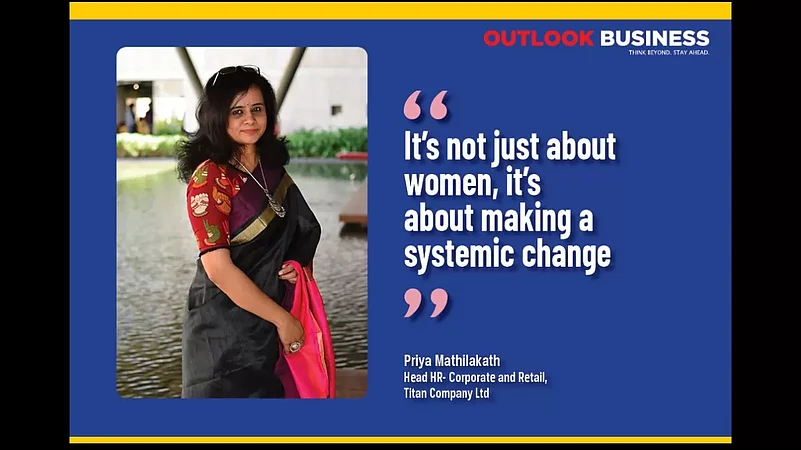Happy Women’s Day 2023! It’s March 8, a day that not just celebrates ‘being a woman’ but also when the global opinion redeems to gender equality. With #EmbraceEquity as the crown theme this year, folks across the world are now stepping up to make society a warmer and more conscious space for women and all genders alike.
The corporate world is no exception. In fact, corporates are initiating important discussions around gender equality and leading the way for others. In an exclusive conversation with Outlook Business, Priya Mathilakath, Head HR- Corporate and Retail, Titan Company Ltd., discusses what it means to be a woman in a leadership role. From gender gap to menstrual relief in corporate, Priya Mathilakath discusses it all with us, this International Women’s Day.
Gender gap has been an age old problem even for the most developed nations. As India progresses towards becoming a world leader, what can it do to mitigate this problem?
Fundamentally, gender gap or imbalance reflects a systemic problem and narrowing this must be a conscious action. Since this is so deep rooted, it becomes critical to identify patterns to address the biases and talk about the inequities.
While March 8 is celebrated as the International Women’s Day, I still think that there is a lot of ground to cover despite the journey gaining some momentum. But we should now start talking about all genders and so, I’d like to say that it’s not just about women; it’s about making the systemic change and becoming a society that embraces all genders.
But please understand that change is not just effected by a policy; you could have a great policy but no change. But when people of the society and leaders of the organisations bring changes, that’s when its effective. So, while implementing the right tools is important, it is equally important for the political and administrative leaders to be vocal change makers, championing and monitoring the results, and being accountable for them.
Titan has over 100 franchises that are completely handled by women. Do you all see a difference in work productivity with this step?
Over the years, we have collected information on the way our stores perform, both in terms of longevity and the lifetime value of a customer. Having said this, we do believe in having a workforce that is balanced – we have some stores where we have 100 per cent women workforce and they are doing really well. We also have some where there are 100 per cent men and some have 30-40 per cent women/men. So, I must say that stores where there is a balance of workforce, the productivity is really good because you see different perspectives coming alive in the conversations and customers.
Therefore, having the right balance has worked for Titan and the firm believes in preparing a level-playing field for high quality talent, having balanced representation with systematic approach and allowing every individual, regardless of the gender, to achieve their full potential. As an organisation, we must ensure that we are an equitable space where the best talent comes and lives up to its potential.
As an organisation, Titan wants to encourage greater representation of women and therefore, at the sourcing stage itself, we try and look at achieving ‘all gender representation.’ But I still think that it’s the society that needs to be comfortable with people declaring their genders
Menstrual leaves have become a hot topic lately but as much as the chit-chat is there, enough is not being done about it. What is your stand on this and should corporates encourage it?
I do agree with you, Pragatti that enough is not being done; in fact, we have internally had a lot of conversations on this subject. The fact remains that as more women enter the workforce, it becomes important to acknowledge the need for more equitable and comfortable working conditions to help in sustaining their careers.
Menstruation and menopause are biological phenomenon for women and at Titan, we seek to support employees and their ability towards self care during this time. Through our wellness initiative, the idea is to have conversations around this space, to remove the stigma and taboo surrounding menstruation and menopause. We also follow a consultative process to provide any relief or policies to our employees. As far as a formal policy for menstrual relief-like opportunities for less working hours, self-care etc., go, considerations are currently underway.
We did our own study as well by involving the women in our organisation and we realised that sometimes, our employees could just need that leave – be it menstruation or menopause. So, Pragatti, since we are a multi-generational workforce, we also discussed that instead of labelling these leaves, we would rather give them the required time off for any of these critical situations. All this is under discussion and we may soon be come up with a policy as well.
I read in one of Titan's HR policies that the company encourages women to connect directly with senior women leaders. How is this shaping the company?
Pragatti, global research and our own focus group conversations across the organisation showed that women face problems in getting promoted without being mentored. So, we realised that mentoring women is one of the best ways to equalise leadership in the workplace. Now, at Titan, this step is helping us close the gender gap in business leadership. Here, we also follow a structured approach where we focus on matching skills and interests of the mentor and the mentee for a successful working dynamic. It also helps to create a pipeline of women leaders that will help us strengthen the company, especially in leadership roles.
So, it’s not just about mentoring women or having more women in the organisation, it is about adequate representation of all genders in the organisation which should be the leadership's agenda.
In one of our focus group discussions, we also found that women find it very difficult to raise their hand to take on higher level roles across organisation despite being ready. So, to make this shift, we have some programs where we are mentoring women to take up more leadership roles. At Titan, our top leadership comprises 16 per cent women, which is higher than what the industry best women organisations are, at about 15.5 per cent. So, it is at the middle where we need to build more strength of women leaders.
In several job roles, a certain percentage is being reserved for women. Do you think mandating this percentage helps?
That’s a very good question, Pragatti (smiles). Since you used the word ‘mandate’, I will pick from there; I think this is where the challenge is. It is important to bring in more women but we also need to remember that every role can be taken up by every gender. For example, if you look at the mines of Tata Steel, we have always had women in workforce.
So, nothing is really binding on genders; it’s just that the process should be consultative. If it isn’t, there is a risk of it being perceived as a quota system and not merit-based. Without having these percentages set, we will all be just talking about policies but not see them getting translated something good.
Let’s not forget that we are doing all this to see an equitable workforce. So, setting goals in a consultative manner is important and this happens when leaders take on the role themselves. If you want such decisions coming from leaders, you have to work towards an inclusive mindset because when this happens, leaders will be keen on taking up more women. It is a hard road, it takes time but you need to stay the course.































